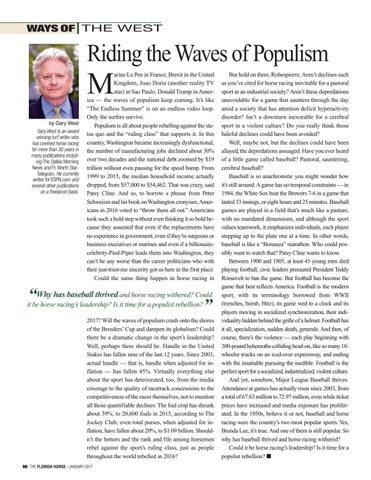PlayersPage_West.qxp_Florida Horse_template 12/15/16 2:27 PM Page 1
WAYS OF The wesT
Riding the Waves of Populism
M
by Gary West Gary West is an award winning turf writer who has covered horse racing for more than 30 years in many publications including The Dallas Morning News and Ft. Worth StarTelegram. He currently writes for ESPN.com and several other publications on a freelance basis.
arine Le Pen in France, Brexit in the United Kingdom, Joao Doria (another reality TV star) in Sao Paulo, Donald Trump in America — the waves of populism keep coming. It’s like “The Endless Summer” is on an endless video loop. Only the surfers survive. Populism is all about people rebelling against the status quo and the “ruling class” that supports it. In this country, Washington became increasingly dysfunctional, the number of manufacturing jobs declined about 30% over two decades and the national debt zoomed by $19 trillion without even pausing for the speed bump. From 1999 to 2015, the median household income actually dropped, from $57,000 to $54,462. That was crazy, said Patsy Cline. And so, to borrow a phrase from Peter Schweizer and his book on Washington cronyism, Americans in 2016 voted to “throw them all out.” Americans took such a bold step without even thinking it so bold because they assumed that even if the replacements have no experience in government, even if they’re surgeons or business executives or marines and even if a billionairecelebrity-Pied-Piper leads them into Washington, they can’t be any worse than the career politicians who with their just-trust-me sincerity got us here in the first place. Could the same thing happen in horse racing in
“Why has baseball thrived
and horse racing withered? Could it be horse racing’s leadership? Is it time for a populist rebellion?
”
2017? Will the waves of populism crash onto the shores of the Breeders’ Cup and dampen its globalism? Could there be a dramatic change in the sport’s leadership? Well, perhaps there should be. Handle in the United Stakes has fallen nine of the last 12 years. Since 2003, actual handle — that is, handle when adjusted for inflation — has fallen 45%. Virtually everything else about the sport has deteriorated, too, from the media coverage to the quality of racetrack concessions to the competitiveness of the races themselves, not to mention all those quantifiable declines: The foal crop has shrunk about 39%, to 20,600 foals in 2015, according to The Jockey Club; even total purses, when adjusted for inflation, have fallen about 20%, to $1.09 billion. Shouldn’t the bettors and the rank and file among horsemen rebel against the sport’s ruling class, just as people throughout the world rebelled in 2016?
66 THE FLORIDA HORSE • JANUARY 2017
But hold on there, Robespierre. Aren’t declines such as you’ve cited for horse racing inevitable for a pastoral sport in an industrial society? Aren’t these depredations unavoidable for a game that saunters through the day amid a society that has attention deficit hyperactivity disorder? Isn’t a downturn inexorable for a cerebral sport in a violent culture? Do you really think those baleful declines could have been avoided? Well, maybe not, but the declines could have been allayed, the depredations assuaged. Have you ever heard of a little game called baseball? Pastoral, sauntering, cerebral baseball? Baseball is so anachronistic you might wonder how it’s still around. A game has no temporal constraints — in 1984, the White Sox beat the Brewers 7-6 in a game that lasted 33 innings, or eight hours and 25 minutes. Baseball games are played in a field that’s much like a pasture, with no mandated dimensions, and although the sport values teamwork, it emphasizes individuals, each player stepping up to the plate one at a time. In other words, baseball is like a “Bonanza” marathon. Who could possibly want to watch that? Patsy Cline wants to know. Between 1900 and 1905, at least 45 young men died playing football; civic leaders pressured President Teddy Roosevelt to ban the game. But football has become the game that best reflects America. Football is the modern sport, with its terminology borrowed from WWII (trenches, bomb, blitz), its game wed to a clock and its players moving in socialized synchronization, their individuality hidden behind the grille of a helmet. Football has it all, specialization, sudden death, generals. And then, of course, there’s the violence — each play beginning with 300-pound behemoths colliding head-on, like so many 18wheeler trucks on an iced-over expressway, and ending with the insatiable pursuing the inedible. Football is the perfect sport for a socialized, industrialized, violent culture. And yet, somehow, Major League Baseball thrives. Attendance at games has actually risen since 2003, from a total of 67.63 million to 72.97 million, even while ticket prices have increased and media exposure has proliferated. In the 1950s, believe it or not, baseball and horse racing were the country’s two most popular sports. Yes, Brenda Lee, it’s true. And one of them is still popular. So why has baseball thrived and horse racing withered? Could it be horse racing’s leadership? Is it time for a populist rebellion? ■
